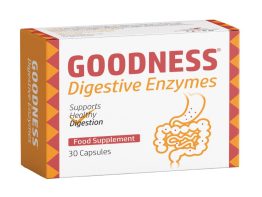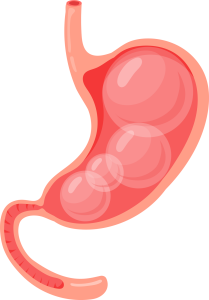Food additives have become a common part of modern diets, helping to preserve, enhance, and flavor the foods we consume daily. While these substances serve important functions in the food industry, they can sometimes cause digestive discomfort, particularly for individuals with sensitive digestive systems or food intolerances. Food additives, such as preservatives, artificial sweeteners, emulsifiers, and colorants, can disrupt digestion, leading to bloating, gas, indigestion, and even allergic reactions.
We will explore the role of food additives, the digestive problems they can cause, and how digestive enzymes can help manage their impact on the digestive system. Finally, we will examine how Goodness Digestive Enzymes can provide relief and support for individuals who experience digestive discomfort due to food additives.
What Are Food Additives?
Food additives are substances added to food products to improve their shelf life, flavor, texture, color, or appearance. These additives can be natural, derived from plant or animal sources, or synthetic, produced through chemical processes. The primary categories of food additives include:
- Preservatives: Prevent spoilage and extend the shelf life of food products (e.g., sulfites, nitrates, and benzoates).
- Artificial sweeteners: Provide sweetness without calories (e.g., aspartame, saccharin, sucralose).
- Emulsifiers: Help mix ingredients that would otherwise separate (e.g., lecithin, polysorbates).
- Colorants: Add or enhance color in foods (e.g., tartrazine, caramel color).
- Flavor enhancers: Boost food taste (e.g., monosodium glutamate (MSG)).
While food additives are generally recognized as safe by food regulatory authorities, some people may be sensitive to certain additives, which can result in adverse reactions such as bloating, gas, diarrhea, headaches, and, in some cases, more serious issues.
Digestive Problems Caused by Food Additives
The impact of food additives on the digestive system varies depending on the type of additive, the individual’s sensitivity, and the amount consumed. Here are some common digestive problems linked to food additives:
1. Bloating and Gas
Additives like emulsifiers and artificial sweeteners can disrupt the natural balance of bacteria in the gut, leading to the fermentation of undigested food and the production of gas. This can cause bloating, abdominal discomfort, and excessive flatulence. Artificial sweeteners such as sorbitol and mannitol, which are sugar alcohols, are poorly absorbed in the small intestine and can lead to fermentation in the colon, causing gas and bloating.
2. Indigestion and Stomach Pain
Preservatives and artificial ingredients can irritate the lining of the digestive tract, leading to indigestion, heartburn, and abdominal pain. Additives like MSG, nitrates, and certain preservatives can trigger digestive upset in sensitive individuals, making it difficult for them to digest foods comfortably.
3. Diarrhea
Some food additives, particularly artificial sweeteners like sorbitol, mannitol, and xylitol, can have a laxative effect in large amounts. These sugar alcohols draw water into the intestines, causing diarrhea and loose stools. Similarly, additives like sulfites, which are used as preservatives in processed foods, can cause diarrhea in individuals who are sensitive to these compounds.
4. Inflammation and Allergic Reactions
Food additives like sulfites, tartrazine (a food dye), and certain preservatives can trigger inflammation and allergic reactions in sensitive individuals. This may result in symptoms like nausea, vomiting, hives, or, in severe cases, anaphylaxis. Sulfites, in particular, can cause reactions ranging from mild digestive discomfort to more severe respiratory issues in people with sulfite sensitivity.
How Digestive Enzymes Help Manage the Impact of Food Additives
Digestive enzymes are proteins that break down food into smaller, absorbable molecules. They are essential for the proper digestion and absorption of nutrients. When food additives disrupt digestion or contribute to digestive discomfort, digestive enzymes can help improve the breakdown of food components, reduce inflammation, and minimize the negative impact of food additives on the digestive system.
Here are some of the key digestive enzymes that can help manage the effects of food additives and how they work:
1. Amylase
Amylase is an enzyme that breaks down carbohydrates, such as starches and sugars, into simpler sugars like glucose. Many processed foods containing additives also contain refined carbohydrates, which can contribute to bloating and gas if not properly digested.
How Amylase Helps: Amylase helps reduce the amount of undigested carbohydrates that reach the colon, preventing fermentation by gut bacteria and reducing gas and bloating. This enzyme can also assist in the digestion of artificial sweeteners that may otherwise cause digestive distress.
2. Protease
Protease is an enzyme that breaks down proteins into smaller peptides and amino acids, which the body can absorb. Processed meats and other foods preserved with additives like nitrates often contain large amounts of protein, and improper digestion of these proteins can lead to indigestion and bloating.
How Protease Helps: Protease aids in the efficient digestion of proteins, reducing the likelihood of undigested proteins fermenting in the gut. This helps alleviate the bloating, gas, and discomfort caused by the interaction of food additives with protein-rich foods.
3. Lipase
Lipase breaks down dietary fats into fatty acids and glycerol, facilitating the body’s absorption. Many processed foods, especially those containing emulsifiers, are rich in fats that can be difficult to digest, particularly for individuals with fat malabsorption issues.
How Lipase Helps: Lipase enhances fat digestion, preventing the buildup of undigested fats in the digestive tract. This reduces the strain on the digestive system and helps manage symptoms like bloating, indigestion, and diarrhea resulting from fat-heavy, processed foods.
4. Lactase
Lactase is an enzyme that breaks down lactose, the sugar found in dairy products. Many processed foods, especially those containing dairy ingredients, can be difficult for lactose-intolerant individuals to digest, leading to symptoms such as bloating, gas, and diarrhea.
How Lactase Helps: Lactase helps break down lactose into glucose and galactose, which are easier for the body to absorb. By improving the digestion of dairy-based ingredients in processed foods, lactase can prevent symptoms like gas, bloating, and diarrhea, particularly in individuals who are lactose intolerant and sensitive to the dairy additives found in many processed foods.
5. Alpha-Galactosidase
Alpha-galactosidase is an enzyme that breaks down complex carbohydrates, particularly those found in legumes, beans, and certain vegetables. Many processed and preserved foods contain complex carbohydrates or fibers that can challenge the digestive system to break down, resulting in gas and bloating.
How Alpha-Galactosidase Helps: By breaking down these complex carbohydrates into simpler, more digestible forms, alpha-galactosidase reduces the fermentation of undigested carbohydrates in the gut, thereby alleviating gas and bloating caused by food additives in processed foods.
6. Cellulase
Cellulase is an enzyme that breaks down cellulose, a complex carbohydrate found in plant cell walls. While the human body cannot produce cellulase alone, this enzyme is necessary for digesting high-fiber plant foods containing additives or preservatives.
How Cellulase Helps: Cellulase aids in the breakdown of plant fibers, which can lead to digestive discomfort when consumed in large amounts or processed. This enzyme can help reduce bloating and digestive strain caused by high-fiber processed foods.
How Goodness Digestive Enzymes Can Help Manage the Impact of Food Additives
Goodness Digestive Enzymes provides a comprehensive blend of enzymes that target the various food components often affected by additives, helping to alleviate these additives’ negative impact on digestion. This carefully formulated supplement includes enzymes like amylase, protease, lipase, lactase, alpha-galactosidase, and cellulase, which support the body’s ability to break down and digest carbohydrates, proteins, fats, dairy, and fibers efficiently.
Here’s how Goodness Digestive Enzymes specifically helps manage the impact of food additives:
- Improved carbohydrate digestion: Goodness Digestive Enzymes, which include amylase and alpha-galactosidase, reduce the fermentation of undigested carbohydrates in the gut, alleviating bloating and gas that can result from emulsifiers and artificial sweeteners in processed foods.
- Enhanced protein breakdown: The protease in Goodness Digestive Enzymes helps ensure that proteins, especially those found in processed and preserved meats, are efficiently digested, reducing the chance of indigestion and bloating from additives like nitrates and MSG.
- Support for fat digestion: Lipase is key in breaking down fats found in processed foods, often made with added fats and emulsifiers. Lipase helps prevent digestive discomfort and diarrhea linked to these additives by promoting efficient fat digestion.
- Dairy intolerance management: For those sensitive to dairy additives, the lactase in Goodness Digestive Enzymes ensures that lactose is properly digested, preventing the gas, bloating, and diarrhea commonly associated with dairy additives in processed foods.
- Fiber breakdown: With the addition of cellulase, Goodness Digestive Enzymes support the digestion of plant-based fibers, which can be challenging to process in foods containing certain preservatives or emulsifiers. This helps alleviate bloating and constipation related to fiber-heavy processed foods.
Conclusion
Food additives, while helpful for food preservation, flavor, and texture, can cause digestive discomfort for many people, especially those with sensitive digestive systems or food intolerances. The impact of food additives on the digestive system can be significant, ranging from bloating and gas to diarrhea and indigestion. However, digestive enzymes offer a natural way to support and improve digestion by breaking down the problematic food components affected by additives.
Goodness Digestive Enzymes provides a powerful blend of enzymes designed to enhance the digestion of carbohydrates, proteins, fats, and dairy, minimizing the negative impact of food additives on the digestive system. By promoting more efficient digestion and reducing the fermentation of undigested food, Goodness Digestive Enzymes can help alleviate the common digestive symptoms caused by food additives, improving comfort and digestive health.
-
Product on sale
 Goodness Digestive EnzymesOriginal price was: $ 29.95.$ 25.95Current price is: $ 25.95.
Goodness Digestive EnzymesOriginal price was: $ 29.95.$ 25.95Current price is: $ 25.95.






